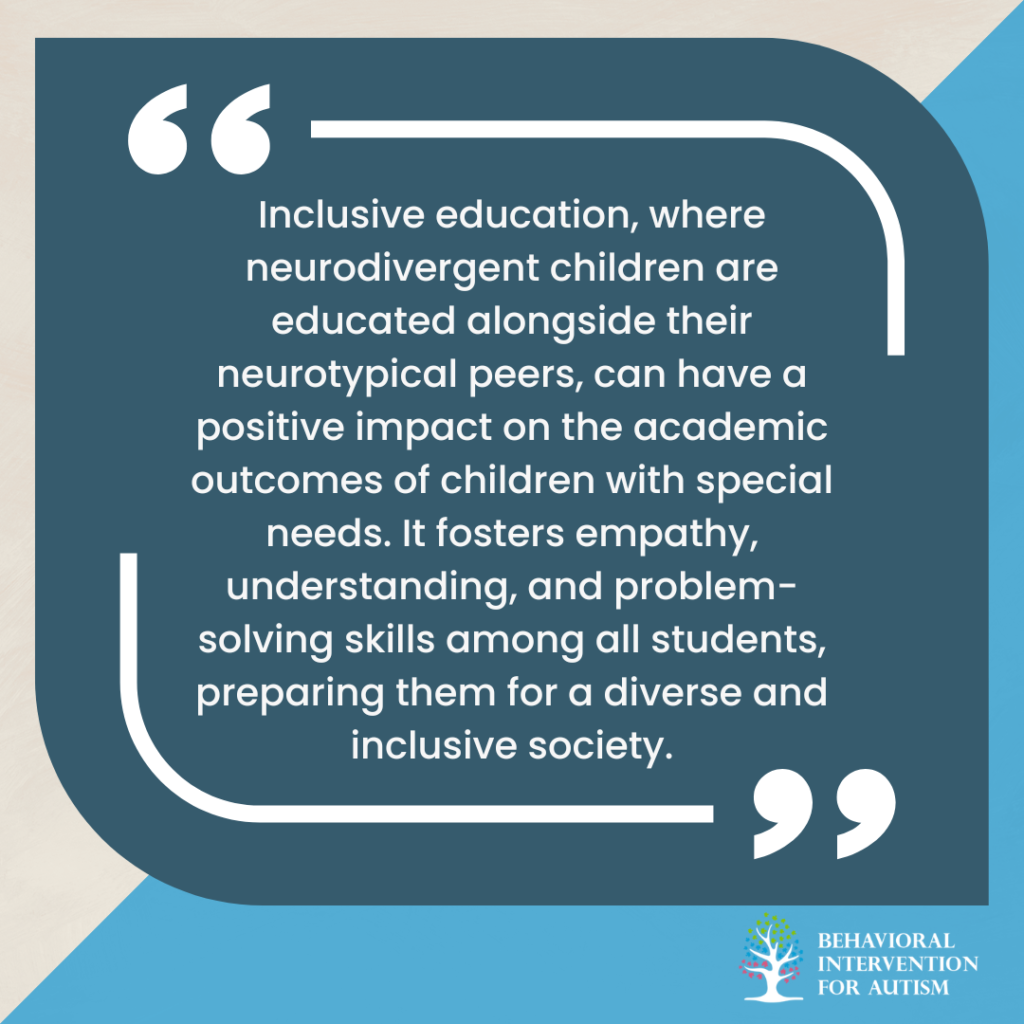
Table of Contents
Through mainstream and inclusive education and with the proper support and accommodations, many autistic children can flourish in regular school settings. Inclusive education in mainstream schools has shown numerous benefits. It not only provides opportunities for neurodivergent children to learn alongside their neurotypical peers but also fosters empathy, understanding, and problem-solving skills among all students.
Here, we will explore inclusive education, its benefits, and the challenges faced by autistic children in mainstream schools.
Benefits of Inclusive Education
Inclusive education holds several advantages for children with autism. By being educated in regular classrooms, they have the opportunity to interact and learn from their neurotypical peers. This inclusive environment promotes social inclusion, allowing children with autism to develop important social skills and build meaningful relationships. Additionally, inclusive education exposes children without autism to neurodiversity, fostering acceptance and understanding.
Research has shown that inclusive education can lead to improved academic outcomes for children with special needs. By being exposed to higher academic standards and engaging with a diverse range of learners, autistic children often rise to the challenge and excel in their academic pursuits. Inclusive education also provides a sense of belonging and self-esteem, as children with autism feel valued and accepted within their school communities.
Challenges Faced by Autistic Children
While inclusive education has numerous benefits, it is important to acknowledge the challenges that autistic children may face in mainstream schools. These challenges can include sensory overload, social interaction difficulties, and executive functioning challenges. Sensory overload occurs when the environment becomes overwhelming due to excessive noise, bright lights, or strong smells, which can lead to sensory meltdowns or shutdowns.
Social interaction difficulties can make it challenging for autistic children to navigate social situations and form friendships. They may struggle with understanding social cues, initiating conversations, or interpreting non-verbal communication. Executive functioning challenges, such as organizing tasks, managing time, and transitioning between activities, can also impact their ability to keep up with the demands of a typical school day.
To support autistic children in mainstream schools, it is crucial to create a supportive environment that caters to their unique needs. Strategies may include creating a sensory-friendly classroom, providing visual schedules, breaking tasks into smaller steps, and enrolling them in social skills groups.
Individualized Education Plans (IEPs) play a vital role in outlining accommodations, modifications, and services required for their success. Collaborating closely with the school and the IEP team is essential to create an inclusive and supportive learning environment for the child.
By addressing these challenges and providing tailored support, autistic children can thrive in mainstream schools. With the right strategies in place, they have the opportunity to reach their full potential, embracing their unique strengths and talents. Inclusive education not only benefits the individual child but also contributes to a more diverse and inclusive society as a whole.
Supporting Autistic Children
When it comes to supporting autistic children in mainstream schools, creating a supportive environment and implementing individualized education plans (IEPs) are key factors in their success. Additionally, incorporating fun learning tools can contribute to their development and engagement.
Creating a Supportive Environment
Autistic children in mainstream schools may encounter challenges related to sensory overload, social interaction difficulties, and executive functioning. To support them effectively, it is essential to create a sensory-friendly environment that minimizes overwhelming stimuli. Some strategies to consider include:
- Providing a quiet space for sensory breaks
- Using visual schedules and cues to enhance predictability
- Breaking tasks into smaller steps to facilitate understanding and completion
- Implementing sensory-friendly classroom design, such as soft lighting and flexible seating options
By implementing these strategies, educators can create an inclusive and supportive environment that caters to the unique needs of autistic children.
Individualized Education Plans (IEPs)
It is essential for parents, educators, and the IEP team to collaborate closely to develop and implement effective plans.
IEPs typically include:
- Specific academic goals tailored to the child’s abilities and needs
- Accommodations and modifications to support learning and participation
- Services like speech therapy, occupational therapy, or counseling as needed
- Regular progress monitoring and adjustments to the plan as necessary
By incorporating IEPs, schools can provide individualized support that maximizes the potential of autistic children in a mainstream educational setting.
When it comes to the education of neurodivergent children, including those with autism, mainstream schools have the potential to offer numerous opportunities for growth and success. With the right support and strategies in place, these children can thrive in a normal school setting, reaching their full potential and embracing their unique strengths and talents.
Opportunities for Neurodivergent Children
The benefits of inclusive education for neurodivergent children are vast. It provides them with opportunities to learn alongside their peers, engage in social interactions, develop communication skills, and build meaningful relationships. Being part of a mainstream school environment can also help enhance their self-esteem and sense of belonging.
One of the primary goals of inclusive education is to ensure that all children, including those with autism, have the opportunity to reach their full potential. By providing appropriate support and accommodations, schools can help neurodivergent children overcome challenges and achieve academic success.
By embracing inclusive education and implementing the necessary support and strategies, neurodivergent children, including those with autism, can thrive in mainstream schools. They have the opportunity to learn, grow, and succeed alongside their neurotypical peers, ultimately reaching their full potential in a normal school setting.
Autism Statistics and Education
When considering the feasibility of autistic children attending mainstream schools, it’s important to understand the prevalence of autism and the current state of school inclusion for individuals on the autism spectrum.
Prevalence of Autism
According to the National Autistic Society, autism affects more than 1 in every 100 of the population, which equates to approximately 700,000 people. Autism, also known as Autistic Spectrum Disorder (ASD), is a pervasive developmental disability that affects individuals in various ways.
School Inclusion Statistics
In recent years, there has been a push towards inclusive education for individuals on the autism spectrum. In England, 71% of children with autism attend mainstream schools, aiming to provide them with the opportunity to learn alongside their neurotypical peers. However, research indicates that mainstream schools are often ill-equipped to fully educate and support the needs of autistic children.
Inclusion in mainstream schools also brings challenges such as bullying and a lack of understanding about autism. Approximately 40% of children on the autism spectrum have experienced bullying, leading to negative consequences such as missed school days or changing schools. Furthermore, only 30% of parents of children with autism in mainstream education report being satisfied with the level of understanding about autism across the school.
Addressing these challenges requires a collaborative effort from educators, parents, and policymakers. It is essential to create an inclusive and supportive environment that promotes the educational and social development of autistic children. By providing adequate training for teachers, raising awareness about autism, and implementing strategies to prevent bullying and exclusion, we can work towards empowering autistic children and ensuring their success in mainstream schools.
In the next sections, we will explore the importance of teacher training and support, as well as strategies to address bullying and exclusion, to further understand the factors that contribute to the feasibility of autistic children in regular schools.
Teacher Training and Support
Ensuring that teachers receive adequate training and support is crucial for the successful inclusion of autistic children in mainstream schools. It is essential for educators to have the knowledge and skills necessary to meet the unique needs of these students. I
Adequacy of Teacher Training
According to a 2013 survey conducted by the charity Ambitious About Autism, 60% of teachers in England expressed that they do not feel they have received sufficient training to effectively teach children with autism. This highlights the need for comprehensive and ongoing professional development opportunities for educators.
To create an inclusive environment for autistic children, teachers require training that goes beyond basic awareness of autism. They should receive specialized training that covers strategies for communication, behavior management, sensory needs, and individualized instruction. With this training, teachers can better understand the strengths and challenges of autistic children and implement appropriate teaching methods.
It is crucial for educational institutions to prioritize and invest in continuous professional development programs that equip teachers with the necessary tools and knowledge to support autistic children effectively. This can include workshops, seminars, and collaboration with specialists in the field of autism education.
Access to Specialist Support
In addition to teacher training, access to specialist support is vital in ensuring the success of autistic children in mainstream schools. Specialist support can come in the form of autism specialists, educational psychologists, speech therapists, occupational therapists, and other professionals with expertise in supporting individuals with autism.
However, research indicates that accessing specialist support for children with autism has become increasingly challenging. According to the same survey mentioned earlier, 35% of teachers believe that it has become harder in the last 12 months to access specialist support for autistic children.
Providing schools with adequate resources and funding to employ or collaborate with specialists can make a significant difference in the educational experience of autistic children. These specialists can work closely with teachers to develop individualized education plans (IEPs) and provide guidance on implementing effective strategies for learning and behavior management.
By ensuring that teachers receive proper training and have access to specialist support, schools can create an environment that supports the unique needs of autistic children. This collaborative approach between teachers, specialists, and other professionals can greatly enhance the educational experience and promote the overall well-being of autistic students in mainstream schools.
Addressing Bullying and Exclusion
In the pursuit of inclusive education for autistic children in mainstream schools, it is essential to address the challenges of bullying and exclusion that these individuals may face. Understanding the impact of bullying on autistic children and the prevalence of illegal exclusions can help us create a safer and more supportive educational environment.
Impact of Bullying on Autistic Children
Bullying can have severe consequences for all children, but it can be especially detrimental to those on the autism spectrum. According to research, approximately 40% of children on the autism spectrum have experienced bullying. The effects of bullying can be far-reaching and may result in emotional distress, academic difficulties, and social isolation.
Parents of children on the autism spectrum who had been bullied reported that it caused their child to miss school or even change schools. These statistics highlight the urgent need to address bullying and create a safe space for autistic children to thrive academically and socially.
Another concerning issue is the illegal exclusion of autistic children from schools. It has been reported that thousands of autistic children are being informally excluded from schools, with four in ten children experiencing temporary exclusion. Such exclusions not only disrupt a child’s education but also contribute to feelings of isolation and low self-esteem.
Parent satisfaction is a crucial factor in assessing the effectiveness of mainstream schools in accommodating autistic children.
By fostering a culture of acceptance, promoting awareness, and providing appropriate training, we can create an educational environment that is inclusive, supportive, and enriching for all students, including those on the autism spectrum.
Conclusion
In conclusion, the question of whether an autistic child can attend a mainstream school is not just about possibility but about ensuring inclusivity, support, and understanding. With the right accommodations, tailored education plans, and a supportive school community, autistic children can thrive in regular educational settings. By embracing neurodiversity and providing the necessary resources, mainstream schools can offer an enriching and inclusive environment where all students, regardless of their differences, have the opportunity to learn, grow, and succeed together.
Sources:
https://getgoally.com/blog/can-an-autistic-child-go-to-normal-school/
https://www.aspriscs.co.uk/news-blogs/unqualified-and-unstructured-autism-in-mainstream-education/
https://www.autismparentingmagazine.com/best-educational-option/
- Signs of an Autistic Child at Age Two - April 11, 2024
- Can Trauma Cause Autism? - April 11, 2024
- Can an Autistic Child Go to Normal School? - April 11, 2024




